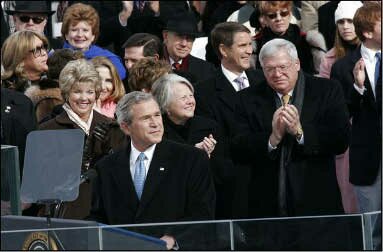
CYRANO'S JOURNAL®
27-Oct-07, 01:04 PMAnnals of Crony Capitalism—Aftermath of Katrina: Bush team tries to pin blame on local officialsDespite abundant examples of venality and gross ineptitude bordering on dereliction of duty, George W. Bush, like Reagan, seems to have a "teflon" quality about him—how's this propaganda miracle accomplished?By Julian Borger, for The Guardian |
http://www.cjonline.org
|
Our contributors' latest pieces
The outrage over the government's relief effort has hit Mr Bush at a time when he is already weakened by the gruelling war in Iraq. The threat is not only to his place in history; it could also cripple his second-term agenda, undermining his plans to privatise the social security system and to end inheritance tax.
|
ALL RIGHTS RESERVED, 2005 CJONLINE.ORG & SPECIFIC AUTHORS. PLEASE SEE OUR COPYRIGHT NOTICE.
|
George Bush II surrounded by members of his fawning "base." In the forefront, Dennis Hastert, Speaker of the House (r), a man who never saw a corrupt deal he didn't love, and Sen. Bill Frist (behind Hastert), heartily applaud the words of wisdom tumbling from Dubya's lips. CJO CopyLeft 2005
Bush administration officials yesterday blamed state and local officials for the delays in bringing relief to New Orleans, as the president struggled to fend off the most serious political crisis of his presidency.
His top officials continued to be pilloried on television talk shows by liberals and conservatives alike, but the White House began to show signs of an evolving strategy to prevent the relief fiasco from eclipsing the president's second term.
The outrage over the government's relief effort has hit Mr Bush at a time when he is already weakened by the gruelling war in Iraq. The threat is not only to his place in history; it could also cripple his second-term agenda, undermining his plans to privatise the social security system and to end inheritance tax.
Mr Bush also faces a much more difficult task in appointing an ideological conservative to take the supreme court seat of William Rehnquist, who died on Saturday.
The White House drew encouragement from an initial poll suggesting most Republican voters were sticking by him, and his supporters also pointed to Mr Bush's track record of recovering from mistakes. His initial response to the September 11 attacks was also sharply criticised. With that in mind, the first plank in the political recovery strategy has been to try to make up for lost time. On Saturday Mr Bush ordered 7,000 more troops to the Gulf coast. As important as the content of the speech was its sombre tone. It was clear the White House realised that making a joke about his young hell-raising days in New Orleans in the course of a flying visit to the flooded city on Friday, was a mistake that reinforced allegations he had failed to take the disaster seriously enough.
The White House also announced yesterday that the president had cancelled public engagements, including a meeting with the Chinese president, Hu Jintao. Instead, he was due to return to the scene of the devastation.
The second element of the White House plan is to insist, in an echo of the September 11 attacks, that the scale of the disaster, the combination of a hurricane and the collapse of the levee system around New Orleans, could not have been foreseen.
Mr Bush was castigated for saying on Wednesday: "I don't think anyone anticipated the breach of the levees". It was pointed out that there had been a string of investigations and reports in recent years which had predicted the disaster almost exactly.
Nevertheless, administration officials stuck to the line yesterday. In a string of television interviews, Michael Chertoff, the head of the homeland security department, called the situation an "ultra-catastrophe", as if the hurricane and flood were unrelated events. "That 'perfect storm' of a combination of catastrophes exceeded the foresight of the planners, and maybe anybody's foresight," he said. The third element in the administration's political response has been to counter-attack against the blame directed at the federal authorities, particularly the Federal Emergency Management Agency (Fema) and its parent body, the homeland security department. In his weekend radio address, Mr Bush implied many of the problems had been caused by lower levels of government. The scale of the crisis "has created tremendous problems that have strained state and local capabilities. The result is that many of our citizens simply are not getting the help they need, especially in New Orleans. And that is unacceptable."
Unnamed White House officials, quoted in the Washington Post, directed blame at the Louisiana governor, Kathleen Blanco, a Democrat, for being slow to call for outside help and to declare a state of emergency. Ms Blanco, meanwhile, resisted a federal attempt to take over control of local police and national guard units - an attempt some Louisiana officials saw as a political manoeuvre that would help blame the weak response in the first week on the state.
The depth of America's polarisation could prove a bulwark preventing Mr Bush's political support from collapsing altogether. A poll by the Washington Post and ABC News on Friday night, showed that, of those questioned, 46% approved of the way the president had handled the relief efforts while 47% disapproved.
The spotlight began to turn yesterday on Michael Brown, the head of Fema, who had minimal emergency management experience before joining the agency in 2001, and had spent the previous 10 years organising horse shows for the International Arabian Horse Association. Press reports claimed he had had to leave that job because of questions about his performance.
Reprinted from The Guardian:
|
